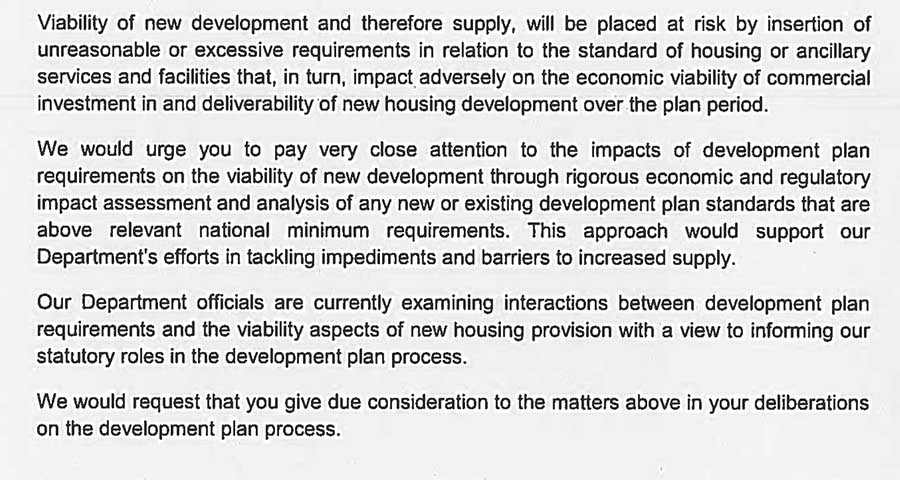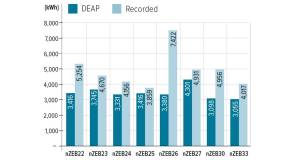
- Government
- Posted
Department of the Environment objects to higher housing standards
The Department of the Environment has written to Dublin’s local authorities warning against adopting higher quality housing standards – and threatened to overrule Dún Laoghaire-Rathdown’s proposal to mandate the passive house standard – in correspondence obtained by Passive House Plus magazine.
The department lodged an error-strewn submission on the consultation deadline on 11 May for Dún Laoghaire-Rathdown's draft county development plan, arguing against the council’s proposal to make the passive house standard mandatory for new buildings. The submission argues that the passive house proposal is “wholly foolhardy and inappropriate,” and warns that if the council doesn’t remove passive house targets the minister may intervene.
“Failure to remove [the passive house proposal] will entail the consideration, by the Minister, of the use of the powers available to him under Section 31 of the Planning Act to ensure the overall coherence of the plan as regards housing supply and housing standards components,” the submission, made by a senior civil servant on behalf of Minister Kelly, states.
The department also warns that if the proposal goes ahead “Generic housing designs for large scale development will need to be redesigned for the DLR area” to meet the passive house standard – a suggestion that may leave the department open to criticism that its attempt to increase housing supply may come at the expense of architectural quality, and clash with the department’s own policy documents on architecture and quality housing design.
The submission warns that “Viability of new development and therefore supply, will be placed at risk by insertion of unreasonable or excessive requirements in relation to the standard of housing or ancillary services and facilities that, in turn, impact adversely on the economic viability of commercial investment in and deliverability of new housing development over the plan period.”
The warning is repeated verbatim in a letter by environment minister Alan Kelly and housing minister Paudie Coffey sent to Dublin-based local authorities on 10 June, which borrows heavily from the submission to Dún Laoghaire-Rathdown.
The submission also makes the unsubstantiated claim that Dún Laoghaire-Rathdown’s passive house proposal “is highly likely to lead to additional costs for housing in DLR.”
The latest issue of Passive House Plus includes several examples which appear to contradict this claim – including a block-built passive house in Co Kildare estimated by builder Pat Doran Construction, a CIF member, to have cost €20,000 less to build than the department’s own suggested specification from its regulatory impact analysis on the 2011 changes to Part L of building regulations. Further examples include four passive houses by Cork-based builder Magner Homes – who favour traditional cavity wall construction – built for under €100 per sq ft and two timber frame houses in Norfolk built for £80 per sq ft. CIF member Michael Bennett & Sons - who built a passive house for former European Parliament president Pat Cox in Blackrock - is currently offering 1160 sq ft three-bed semi-ds built to the passive house standard in Enniscorthy for an asking price of €170,000. The timber frame homes will have an estimated combined annual space heating and hot water cost of €200.
The department’s submission to Dún Laoghaire-Rathdown is at times rendered incomprehensible, due to grammatical errors and sentences that taper off, such as the following paragraph:
“Builders and developers who currently apply the statutory DEAP methodology and do not apply the PHPP methodology may if required to apply PHPP may [sic] bring a legal challenge in the Irish or EU courts. Given that in its endorsement of PHPP DLR Coco would have ignored EU [sic]. It is unclear what defence might [sic]”
The submission also questions the legality of the proposal on the mistaken premise that the passive house target would mean Dún Laoghaire-Rathdown’s “failure to apply” the requirements of Part L of the building regulations, which set minimum performance targets for buildings. The draft development plan makes no reference to the passive house standard relieving developers of the need to ensure that buildings comply with Part L – or any other part – of building regulations.
To read the letter by ministers Kelly and Coffey, click here. https://dl.dropboxusercontent.com/u/6169867/Ministers%27%20letter%20on%20housing%20standards.pdf
Click here to read an FAQ-style article on the implications of making the passive house standard mandatory: http://passivehouseplus.ie/news/government/key-questions-on-the-implications-of-making-passive-house-mandatory.htmL
Related items
-
 Wales unveils net zero pattern book
Wales unveils net zero pattern book -
 Chartered Institute of Building urges VAT overhaul to encourage reuse and renovation
Chartered Institute of Building urges VAT overhaul to encourage reuse and renovation -
 Property industry faces ‘triple threat’ from climate crisis
Property industry faces ‘triple threat’ from climate crisis -
WorldGBC launches green building policy principles for governments
-
 When is an A-rated home really A-rated?
When is an A-rated home really A-rated? -
 Climate action plan sets embodied carbon targets for construction
Climate action plan sets embodied carbon targets for construction

